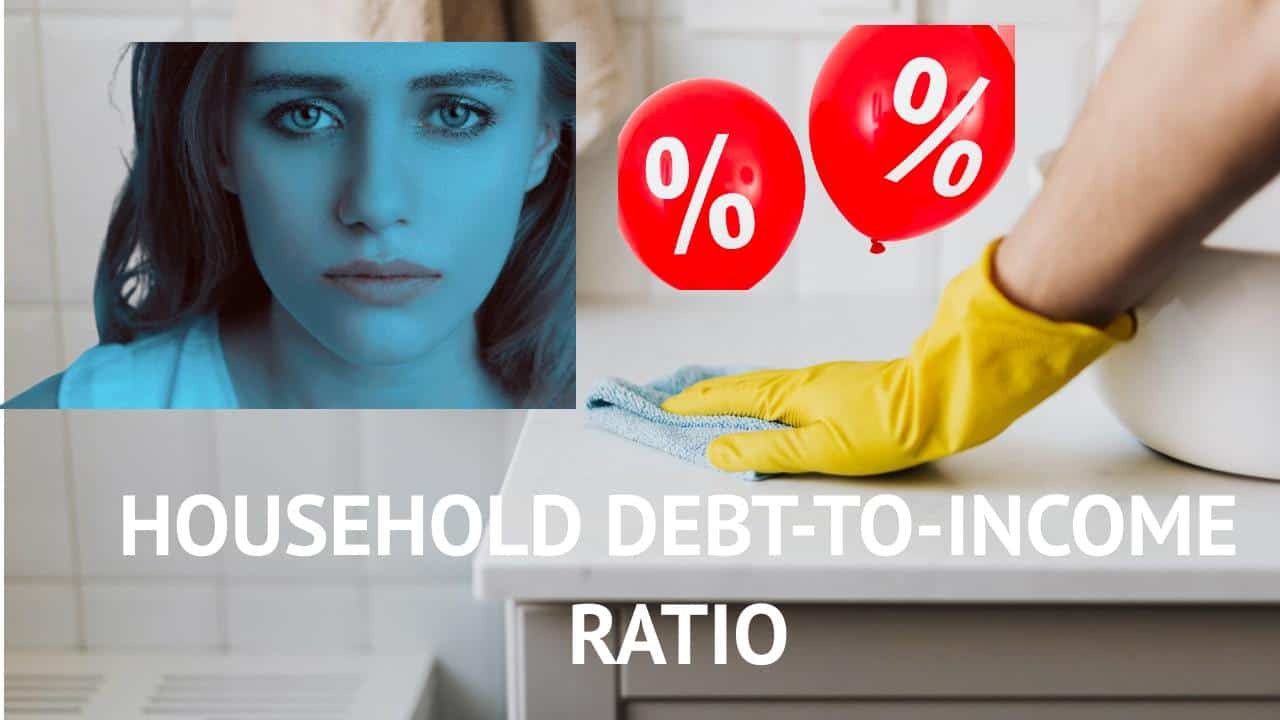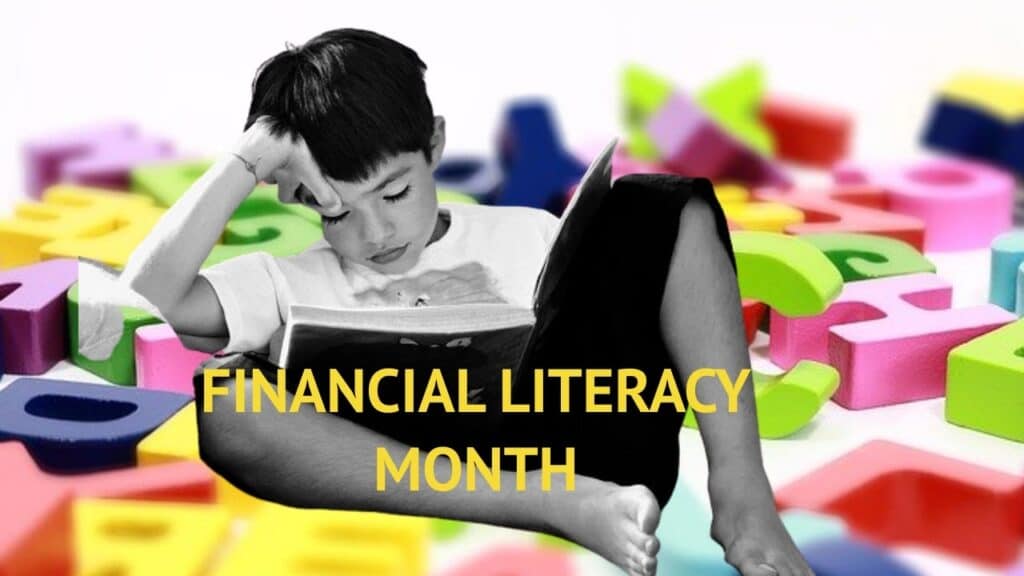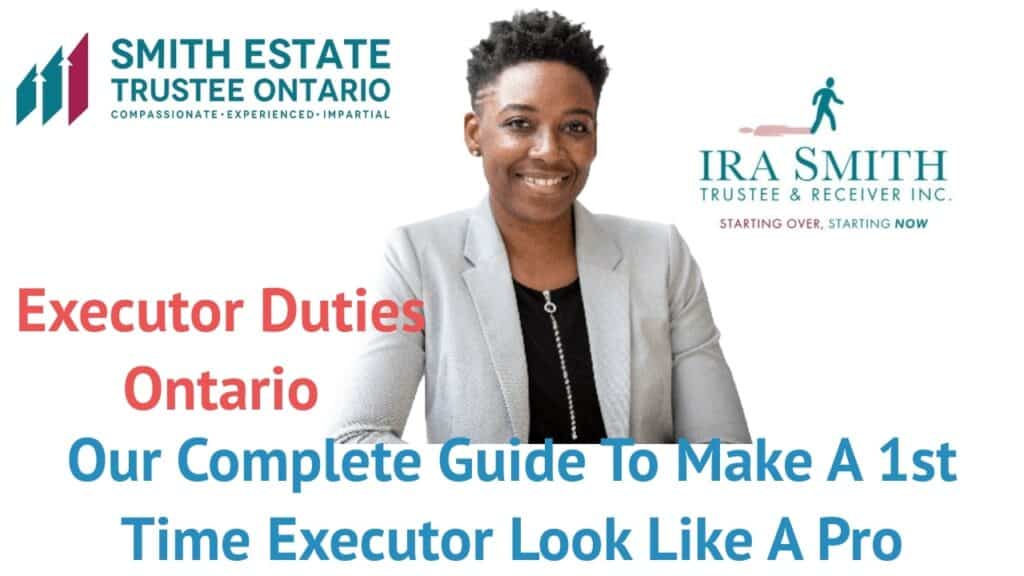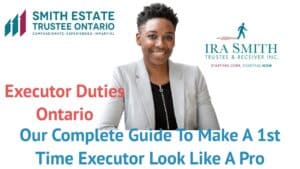We hope that you and your family are safe, healthy, and secure during this coronavirus pandemic.
Ira Smith Trustee & Receiver Inc. is absolutely operational and Ira, in addition to Brandon Smith, is readily available for a telephone consultation or video meeting.
Household debt-to-income ratio: Understanding the debt-to-income (DTI) ratio
Your household debt-to-income ratio indicates how much of your gross monthly income goes toward paying off your debt. In order to find your DTI ratio of household debt percentage, multiply the result by 100. The debt-to-income (DTI) ratio is a measure of how much income a person or organization generates in order to service household credit market debt.
Based on income, the household debt-to-income ratio, or as it is also called, the household debt service ratio, measures a family’s ability to pay monthly debt obligations. Divide the monthly debt obligations by the gross income to calculate the DTI ratio.
When considering a mortgage or loan, the household debt-to-income ratio is a critical metric. You may find it more difficult to get a mortgage if your household debt-to-income ratio is high, or you may end up getting smaller loan approval. Your household debt-to-income ratio is calculated using your income, debt, and credit (mortgage) accounts.
I wrote a blog almost one year ago on the Canadian household debt-to-income ratio at that time. At the time of the COVID-19 pandemic, I discussed what happened to the household debt of Canadians.
I provide an update one year after discussing a recent report by Statistics Canada about the household debt-to-income ratio in Canada during the fourth quarter of 2021.
Household debt-to-income ratio: Debt-to-income ratio example
Here is an easy-to-understand example. Sally is looking to get a loan and is trying to figure out her household debt-to-income ratio. Sally’s monthly bills and income are as follows:
- monthly mortgage debt payment (P+I): $1,000
- monthly auto loan payments: $500
- credit card debt monthly payment: $500
- household gross monthly income: $6,000
- Sally’s total monthly debt payment is $2,000:
- Sally’s household debt service ratio is 0.33:
- 0.33 x 100 = In other words, Sally has a 33% household debt-to-income ratio.
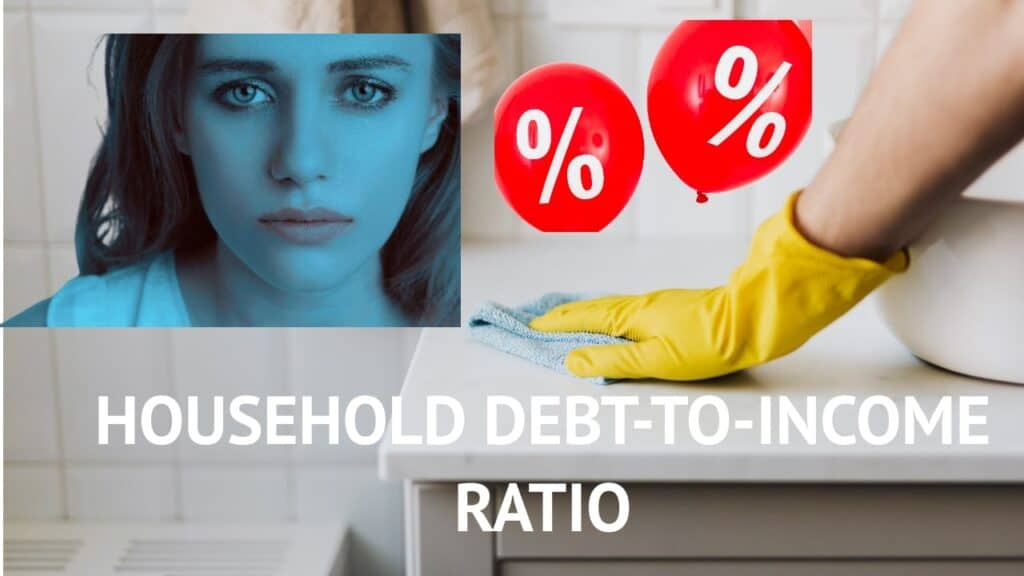
Household debt-to-income ratio: Pre-pandemic debt pressures
Prior to the pandemic, household debt Canadians carried increased steadily. During the last decade, more and more Canadian homes carried debt. Canadian household debt-to-income ratio was 150% in 2012, according to Statistics Canada.
In other words, the increase in debt was rising at a rate of $1.50 for every dollar of income. A DTI ratio of 175.4% was reached in the first quarter of 2020. Before the pandemic, Statistics Canada estimates the household debt-to-income ratio was 181.1 percent.
Debt increases can negatively affect a household’s bottom line, and the larger the debt, the greater the negative impact.
The impact of COVID-19 on the household debt-to-income ratio in 2020: The temporary income boom of 2020 supported Canada’s household debt.
Even if the federal and provincial government financial income support payments given to Canadians through the COVID-19 Economic Response Plan aren’t considered an income surge, it is an income rise.
Fndings released by Canada Mortgage and Housing Corporation (CMHC) in November 2020 showed that the government assistance did help Canadians cope with their household debt.
In the CMHC report, the following were the key findings in Canada:
- By the end of Q2 2020, Canada’s household debt ratio is 17% lower than Q1’s 158%.
- Likewise, the home mortgage DTI ratio fell from 115% to 105%.
- A rise in household disposable income caused these declines.
- The amount of outstanding household debt in Canada did not change.
Canada’s household disposable income increased by almost 11% between Q1 and Q2 of 2020 and by 15% year over year. The extra cash doled out by governments caused this. This new cash in bank accounts was not from greater household savings.
After the government temporarily transferred money to Canadian families, the household debt-to-income ratio declined to the lowest level since 2010.
Household debt-to-income ratio: Uncertainty in household debt during the second wave of COVID-19
During the second wave of the COVID-19 pandemic, the financial situation of Canadians had changed significantly. Especially in the financial real estate industry, the DTI ratio is an indication of financial obligations as a vulnerability.
The Canadian financial institutions stopped deferring mortgage payments at the same time. Even with the then extremely low-interest mortgage rates on mortgage loans, this obviously led to concerns about Canadians’ ability to make their mortgage payments. Other government assistance programs ended.
With the end of government support programs that temporarily boosted monthly household income, Canadians faced uncertainty about how they will be able to carry and pay down their household debt.
In the second quarter of 2021, the household debt-to-income ratio of Canadians decreased in all significant Canadian cities. Normally, such a decline would indicate a general improvement in families’ monthly income, their ability to afford monthly payments and pay off financial debt, be it mortgage debt service or consumer debt such as auto loans and credit card debt service.
Subsidies from the federal government effectively helped households to pay off debt. Canadians were more than likely able to lower their non-mortgage debt during those months. However, the mortgage component of Canadian household debt has increased in the majority of metropolitan areas while employment has decreased.

Canada household debt-to-income ratio: What my predictions of financial challenges for 2021 were
I predicted that as the economy recovers from the economic effects of the Coronavirus, Canadians will be facing a great financial challenge. As a result of the COVID19 pandemic crisis, Canada’s economy pretty much stopped.
Many Canadian families have experienced extensive income losses as a result of this. For those who are heavily indebted, this is particularly true. A key concern with regard to financial stability is whether homes can keep up with their financial obligations. A financial crisis may very well befall highly indebted Canadians.
Bank of Canada was concerned about the financial challenges that Canadians will face in 2021. Can Canadian homes withstand the storm? The answer lies with:
- household financial health as of February 2020;
- the effectiveness of the Canadian Government’s recovery support measures and policy activities; and
- the pace of the labour market’s recovery.
As the economy recovers, the Bank of Canada looks at a variety of household debt factors. Those with greater financial vulnerability are of particular concern. Some factors that will cause concern among the Bank of Canada are:
- The homeowners with few financial safeguards.
- Although it does provide a financial reserve, home equity lines of credit are also associated with increased borrowing.
- Will the government’s fiscal policy help support Canadians until incomes recover to pre-pandemic levels or exceed them?
- In some cases, unemployment rates may not be a reliable indicator of household revenue losses.
We have entered the first quarter of 2022, so let’s see how the economy and Canadians fared in 2021.
Statistics Canada says household debt-to-income ratio hit a record high in Q4
In the fourth quarter of 2021, household disposable income declined as housing prices, housing costs, and mortgage borrowing rose, according to Statistics Canada. As a percentage of disposable income, financial markets saw that household credit market debt rose to 186.2 percent in the fourth quarter, up from 180.4 percent in the third quarter. Credit market debt accounted for $1.86 of household disposable income for every dollar of disposable income.
Consumer credit market debt rose by 1.9 percent in the fourth quarter, while consumer disposable income decreased by 1.3 percent. Household debt increased by $50.0 billion seasonally adjusted in the fourth quarter. A total of $46.3 billion was attributed to mortgages, while $3.7 billion was attributed to non-mortgage loans.
Household debt service ratios increased in the 2021 4th quarter, measured as total obligated payments of principal and interest on credit market debt as a percentage of disposable income. The ratio stood at 184.7 percent in the third quarter of 2018, and the previous record high was 181.1 percent in the fourth quarter of 2019.
Canada household-debt-to-income ratio summary
I hope you enjoyed this household debt-to-income ratio Brandon Blog post. Are you worried because you or your business are dealing with substantial debt challenges and you assume bankruptcy is your only option? Call me. It is not your fault that you remain in this way. You have actually been only shown the old ways to try to deal with financial issues. These old ways do not work anymore.
Ira Smith Team utilizes new modern-day ways to get you out of your debt difficulties while avoiding bankruptcy. We can get you the relief you need and so deserve.
The tension put upon you is big. We know your discomfort factors. We will check out your entire situation and design a new approach that is as unique as you and your problems; financial and emotional. We will take the weight off of your shoulders and blow away the dark cloud hanging over you. We will design a debt settlement strategy for you. We know that we can help you now.
We understand that people and businesses facing financial issues need a realistic lifeline. There is no “one solution fits all” method with the Ira Smith Team. Not everyone has to file bankruptcy in Canada. The majority of our clients never do. We help many people and companies stay clear of bankruptcy.
That is why we can establish a new restructuring procedure for paying down debt that will be built just for you. It will be as one-of-a-kind as the economic issues and discomfort you are encountering. If any one of these seems familiar to you and you are serious about getting the solution you need, contact the Ira Smith Trustee & Receiver Inc. group today Call us now for a no-cost consultation We will get you or your business back up driving to healthy and balanced trouble-free operations and get rid of the discomfort factors in your life, Starting Over, Starting Now.
We hope that you and your family are remaining safe, healthy and secure during this current pandemic.
Ira Smith Trustee & Receiver Inc. is absolutely operational and Ira, in addition to Brandon Smith, is readily available for a telephone consultation or video meeting.

